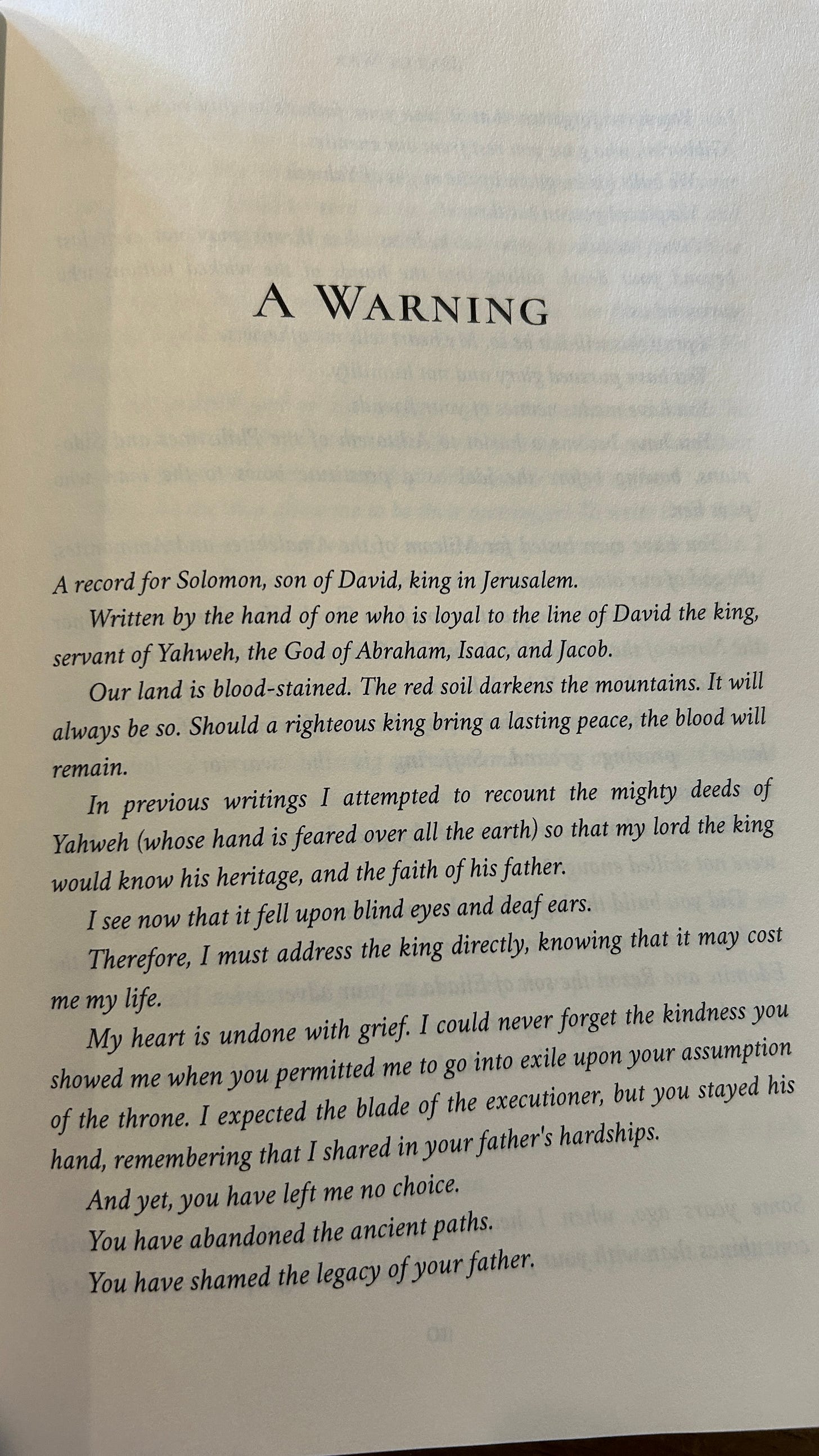As I was reworking these books for the new publisher, Kavod Press, I kept coming back to the sense that something had always been missing. The original version of the initial books of the Lion of War series told the stories I wanted to tell, but they did not yet carry the full vision.
Over the years, I have written side stories, character vignettes, devotional pieces, fragments of other books. Some never saw the light of day, and some were published in scattered form. I made many, many mistakes trying to figure out what to do.
For this rebirth of the series and its vision, I wanted to bring all of those elements together into one complete, cohesive saga, and so a revamp of the format was needed.
All of the key parts of the narrative from Day of War, Covenant of War, and Song of War are still in place, but there is a new character to help the reader experience the story.
In 1 Kings 2, Solomon says something easy to miss if you are just reading quickly through the reigns of kings. He is dealing with the aftermath of his father’s death, taking control of the throne, and issuing judgment on those who opposed David. Among those standing before him is Abiathar the priest. Instead of killing him, as he does with others, Solomon spares his life.
Why?
Because, as Solomon says, “You shared in all my father’s hardships.”
Such a poignant statement, and its context has fascinated me for years.
Abiathar’s story begins in tragedy. He is the last surviving priest from the house of Ahimelech after the massacre at Nob. Doeg the Edomite slaughters the priests under orders from Saul, and Abiathar escapes with nothing but his life and the holy ephod. He flees to David (who is still on the run himself) and tells him what happened. From that moment on, Abiathar is with David for the long, hard road ahead—living in caves, fighting wars, suffering in droughts, hiding in enemy territory, enduring betrayal after betrayal. He was, in a sense, an army chaplain.
When David eventually becomes king, Abiathar is there, helping establish Jerusalem as their capital and center of worship. Later, he is there when David’s royal house begins to unravel.
When Adonijah, the eldest son of David, tries to seize the throne, Abiathar makes a misstep and sides with him (for reasons I will do my best to explore fictitiously in the Lion of War series).
Solomon, David’s chosen heir, never forgets it, but neither does he forget everything else. Instead of executing him, Solomon removes him from the priesthood and sends him away. This is Solomon at his best; he is willing to honor the old days, when David and his men fought desperately to build the kingdom Solomon now rules.
Abiathar’s life is one of faithfulness, courage, loss, miscalculation, and exile. In some ways, his story mirrors David’s. He is not a famous Bible character to modern readers, but he was there for all of it.
That is why I chose him as the “framing device” of this new version of the Lion of War series, and why, even if you have read the original editions, it is worth starting from the beginning again.
You will hear Abiathar’s voice between the chapters. Sometimes he is poetic. Sometimes he is blunt. Always weary and remembering. His words are written as a series of recollections late in his life, addressed directly to Solomon.
I chose to frame the books this way because I think we needed the voice of a witness. Someone grounded in the ways of Yahweh who was actually there, who could provide not only narrative context, but emotional weight. Someone who would have understood what it cost to endure the hardship and win the victories.
In the new Lion of War series, Solomon is in the latter part of his reign. He has built a great kingdom, has constructed a magnificent temple, and has expanded the peaceful reign his father desired for him. And yet, amongst all of that wealth and wisdom, sin creeps in. The king is falling into apostasy. Foreign wives. Foreign gods. A heart no longer fully devoted to Yahweh.
So Abiathar writes to issue a stark warning to Solomon, reminding him of who his father was, and of the Mighty Men who helped him. At one point in the story, Abiathar writes, “Your throne was built by the hand of Yahweh and the blood of the Mighty Men.”
He writes, angrily at times, to make sure the truth is remembered; not the polished version written by Solomon’s royal scribes, but the blood-and-mud version known only by those who lived it. It is a story of divine favor, and the unrelenting sacrifice of men who fought for a king not yet crowned. Men who bled and died in obscurity so that the golden age of Israel could even be possible.
Abiathar is the voice reminding Solomon (and us) of that.
This new version of the complete Lion of War series is everything I hoped to do from the beginning. Kavod Press has given me complete creative freedom to bring this to life. That is not a small thing. In the Christian media landscape of boxed-in expectations and industry rules, being able to tell this story the way it was meant to be told is a rare gift. These are not easy stories. They are rough-edged, like the men who lived them, but, Lord-willing, they are faithful stories, and they connect with the hearts of men.
I believe Abiathar’s narrative voice gives the series additional clarity and weight. He allows us to move around the battlefield, observing these flawed heroes at their best and their worst.
Day of War is now available at the link below on Amazon, and Covenant of War is coming very soon.
Song of War, long-awaited, releases this fall.
Praise and Arrows,
CG




